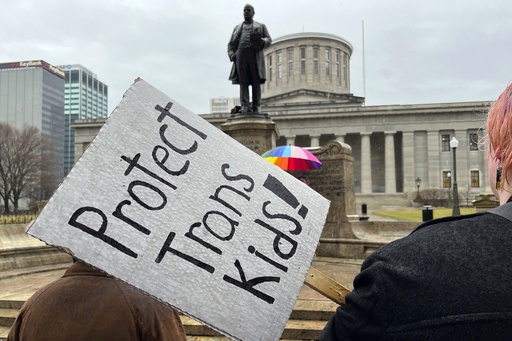WASHINGTON (AP) — The Biden administration’s new Title IX rule expanding protections for LGBTQ+ students has been temporarily blocked in four states after a federal judge in Louisiana found that it overstepped the Education Department’s authority.
In a preliminary injunction granted Thursday, U.S. District Judge Terry A. Doughty called the new rule an “abuse of power” and a “threat to democracy.” His order blocks the rule in Louisiana, which filed a challenge to the rule in April, and in Mississippi, Montana and Idaho, which joined the suit.
The Education Department defended the rule and said it’s reviewing the judge’s order.
“The Department stands by the final Title IX regulations released in April 2024, and we will continue to fight for every student,” the agency said in a statement.
The Louisiana case is among at least seven backed by more than 20 Republican-led states fighting Biden’s rule. The rule, set to take hold in August, expands Title IX civil rights protections to LGBTQ+ students, expands the definition of sexual harassment at schools and colleges, and adds safeguards for victims.
Doughty, who was appointed by former President Donald Trump, is the first judge to block the rule. It deals a major blow to the new protections, which were praised by civil rights advocates but drew backlash from opponents who say they undermine the spirit of Title IX, a 1972 law barring sex discrimination in education.
Louisiana is among several Republican states with laws requiring people to use bathrooms and locker rooms based on their sex assigned at birth, restricting transgender students from using facilities that align with their gender identity. President Joe Biden’s rule clashes with those laws and claimed to supersede them.
The Louisiana lawsuit argued that the new rule would force schools across the four state to pay millions of dollars to update their facilities. In his decision, the judge called it an “invasion of state sovereignty” and concluded that the states were likely to succeed on the merits of the case.
His order says the rule likely violates free speech laws by requiring schools to use pronouns requested by students. It also questions whether the Biden administration has legal authority to expand Title IX to LGBTQ+ students.
“The Court finds that the term ‘sex discrimination’ only included discrimination against biological males and females at the time of enactment,” Doughty wrote in his order.
The judge expressed concern that the rule could require schools to allow transgender women and girls to compete on female sports teams. Several Republican states have laws forbidding transgender girls from competing on girls teams.
The Biden administration has proposed a separate rule that would forbid such blanket bans, but it said the newly finalized rule does not apply to athletics. Still, Doughty said it could be interpreted to apply to sports.
“The Final Rule applies to sex discrimination in any educational ‘program’ or ‘activity’ receiving Federal financial assistance,” he wrote. “The terms ‘program’ or ‘activity’ are not defined but could feasibly include sports teams for recipient schools.”
Judges in at least six other cases are weighing whether to put a similar hold on Biden’s rule. The Defense of Freedom Institute, a right-leaning nonprofit that backed the Louisiana lawsuit, applauded Doughty’s order.
“We are confident that other courts and states will soon follow,” said Bob Eitel, president of the nonprofit and a Trump administration education official.
Biden issued the new rule after dismantling another one created by Trump’s education secretary, Betsy DeVos. That rule narrowed the definition of sexual harassment and added protections for students accused of sexual misconduct.
On the social media platform X on Thursday, DeVos called the Louisiana decision a victory, saying Biden’s “anti-woman radical rewrite of Title IX is not just crazy but it’s also illegal.”
___
The Associated Press’ education coverage receives financial support from multiple private foundations. AP is solely responsible for all content. Find AP’s standards for working with philanthropies, a list of supporters and funded coverage areas at AP.org.
Source: post





